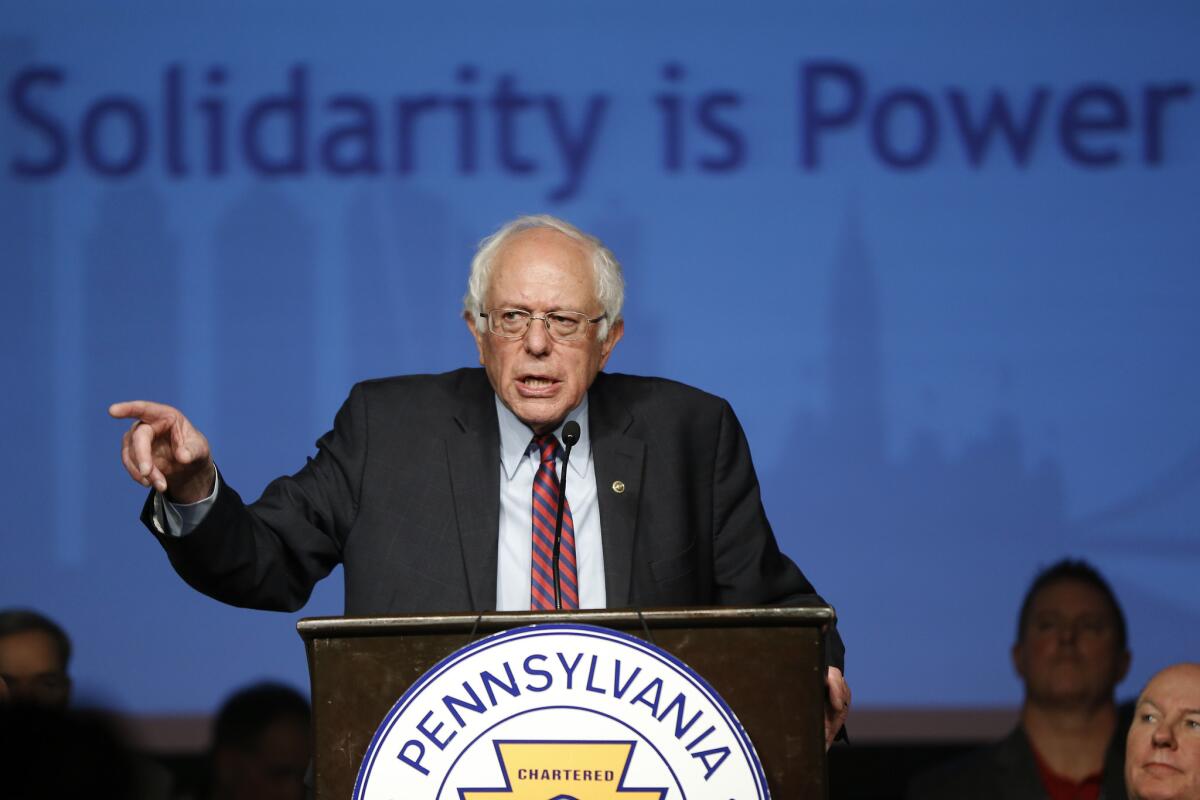It will take a miracle for Bernie Sanders to beat Hillary Clinton. And that’s OK

Democratic presidential candidate Bernie Sanders speaks during a campaign stop at the Pennsylvania AFL-CIO Convention in Philadelphia on April 7.
- Share via
Bernie Sanders can still win the Democratic presidential nomination — but it’s going to take a miracle. Actually, several miracles. He’ll need to win the primary next week in New York, where polls show him running well behind Hillary Clinton. Then he’ll need to win most of the mid-Atlantic states, including Pennsylvania. And he’ll need to win big in California and New Jersey in June; small margins of victory won’t give him the number of delegates he needs to overtake Clinton’s substantial lead. That’s not a conspiracy; it’s just arithmetic.
And that’s OK. This is a case where coming close will still count for something.
From the beginning of his improbable run, Sanders has had two goals in mind. One was to become the Democratic nominee; the other was to build a grass-roots movement that could bring about a “political revolution” from the left.
Sanders and his supporters haven’t given up on the first goal. But they’re also running his
campaign with that second, longer-term goal firmly in mind.
Last week, a voter in New York asked the Vermont senator what he would do if he doesn’t win. Most candidates would have batted the query away. Sanders said: “That is a wonderful question.”
“Obviously, our hope and expectation is that we are going to win,” he said on NBC’s “Today” show. “But that’s a fair question. We have brought out and seen so much excitement from young people … who want to make our country a better place.”
If the nomination is lost, he said, “we will continue that revolution.”
The first step — in the event of a loss — is using the convention as an organizing event for progressives.
Some supporters have talked of an “inside-outside” strategy at the Philadelphia convention, with Sanders delegates pressing their case inside the hall while pro-Sanders demonstrators march outside.
They hope to get some of Sanders’ positions included in the Democratic Party platform, including planks on banning corporate donations to super PACs, renegotiating existing free trade agreements and breaking up the country’s biggest banks.
Clinton has already responded to the energy on her party’s left by tacking in Sanders’ direction on several issues. She now opposes President Obama’s proposed trade agreement with Asian countries, a pact she initially promoted. She also changed course to oppose the proposed Keystone XL oil pipeline from Canada to Texas, although she was never firmly in favor. And she has proposed stricter regulations on big banks and other financial institutions, a plan she argues is tougher than Sanders’ proposal to break up the nation’s largest banks. (Sanders disagrees.)
If Clinton wins the nomination, Sanders has said he will endorse her and urge his supporters to vote for the Democratic ticket. But he will also try to turn his campaign into a more durable movement to move the Democratic Party to the left.
“This campaign is changing people’s lives and changing everyone’s idea of what’s possible,” Sanders’s top technologist, Zack Exley, told The Nation magazine. “No matter what happens, people are going to keep fighting for the political revolution that Bernie helped all of us start. What’s more, these organizing teams, structures, and processes won’t have to be reinvented. They will live on. … This revolution is only just getting started.”
We’ve heard that song before. In 2004, insurgent candidate Howard Dean tried to turn his campaign into a progressive movement, Democracy for America, with negligible results. In 2008, President Obama’s campaign staff tried to remake their grass-roots network into something called Organizing for America, but that effort failed completely.
Could this time be different? Progressive organizers, an eternally optimistic cadre, say they think so.
“This movement is here to stay,” argues Ben Wikler of MoveOn.org.
“Sanders could turn out to be, for progressives, what [Barry] Goldwater was for conservatives in 1964. Goldwater lost, but he paved the way for Ronald Reagan 16 years later. We don’t want to wait that long.”
Harold Meyerson, editor of the American Prospect, thinks they may be right, mainly because the economy’s failure to increase middle-class incomes has pushed so many voters — especially young voters — to look for new answers.
Sanders could turn out to be, for progressives, what [Barry] Goldwater was for conservatives in 1964.
— Ben Wikler of MoveOn.org
He noted that a 2012 Gallup Poll found that 53% of Democrats said they had a positive view of socialism — and that was before Sanders ran for president.
“Bernie Sanders’ campaign didn’t create a new America left,” Meyerson wrote recently. “It revealed it.”
Even if their candidate falls short in the next few primaries, Sanders voters shouldn’t give up in despair. Their votes will still count, because the final score will matter — not only for this presidential campaign, but the next one.
Twitter: @doylemcmanus
Follow the Opinion section on Twitter @latimesopinion and Facebook
MORE FROM OPINION
New York brings out the brawler in Bernie and Hillary
Why a brokered GOP convention would be bad news for both Trump and Cruz
Stop shaming women who support Bernie Sanders into voting for Hillary Clinton
More to Read
A cure for the common opinion
Get thought-provoking perspectives with our weekly newsletter.
You may occasionally receive promotional content from the Los Angeles Times.










